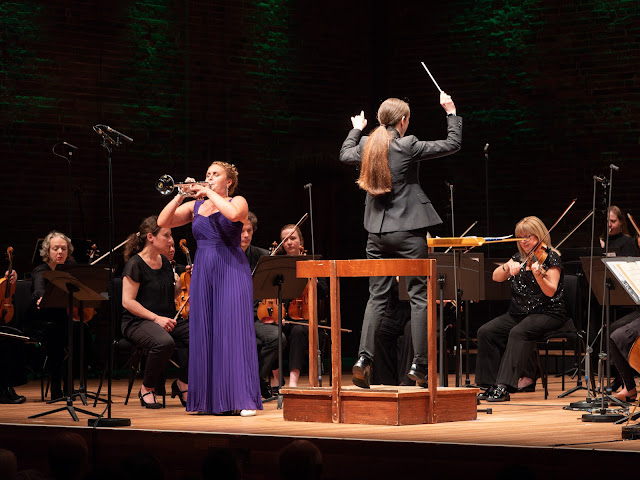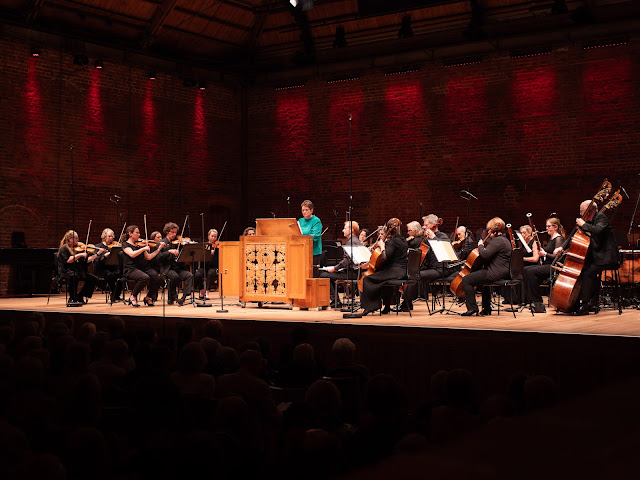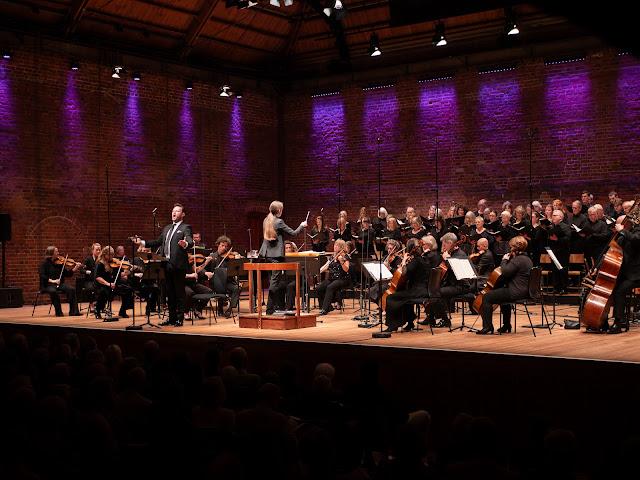 |
| Robin Haigh: LUCK – Matilda Lloyd, Britten Sinfonia, Jessica Cottis – Aldeburgh Festival at Snape Maltings, 2024 (Photo: Angus Cooke) |
Purcell: Chaconny in G minor, Handel: Organ Concerto in D minor, Op.7, No.4, Robin Haigh: LUCK, Britten: Saint Nicolas; Nick Pritchard, Matilda Lloyd, Katherine Dienes-Williams; Britten Sinfonia, Choristers of St Edmundsbury Cathedral, Britten Pears Chorus, cond. Jessica Cottis; Aldeburgh Festival at Snape Maltings
Reviewed by Tony Cooper, 15 June 2024
For its 75th birthday celebrations, the Aldeburgh Festival recreates the festival’s very opening concert from 1948, with one modern twist
The first concert of the Aldeburgh Festival took place in Aldeburgh parish church dedicated to SS Peter and Paul on 15 June 1948 featuring an attractive programme comprising Purcell’s Chaconny in G minor and Handel’s Organ Concerto in D minor paired with Martin Shaw’s God’s Grandeur and Britten’s cantata, Saint Nicolas. For this significant 75th festival, the concert was recreated on 15 June 2024 at Snape Maltings with Shaw’s work replaced by Robin Haigh’s LUCK, a concerto for trumpet and orchestra written for Matilda Lloyd. [Read Robin’s article about writing the work]
Appropriately, the opening work of the first concert of the Aldeburgh Festival in 1948 fell to the well-loved 17th-century English-born composer, Henry Purcell, one of Benjamin Britten’s major musical influences. Therefore, in Purcell’s Chaconny in G minor – a short, sharp, five-minute piece – it provided a nice curtain-raiser to an agreeable and entertaining concert (I should imagine, one of the hottest tickets of the festival) immaculately, crisply and evenly played by the strings of the Britten Sinfonia conducted with great flair and enthusiasm by Australian-British conductor, Jessica Cottis, currently artistic director and chief conductor of the Canberra Symphony Orchestra. The piece was probably composed around 1680 while Purcell was employed by King Charles II and nearly a decade before the composer turned his attention almost exclusively to the theatre after the accession of William III and Queen Mary in 1689.
 |
| Handel: Organ Concerto – Katherine Dienes-Williams, Britten Sinfonia, Jessica Cottis – Aldeburgh Festival at Snape Maltings, 2024 (Photo: Angus Cooke) |
In Handel’s Organ Concerto in D minor, described in the 1948 festival programme book as being ‘distinguished by its noble grandeur’, certainly lived up to this proud statement as New Zealand-born organist, Katherine Dienes-Williams, delivered an unfussed and technically-assured performance playing on a hired portable organ that seemed light of tone but, nonetheless, produced a good broad sound overall in a delightful and tuneful four-movement work showing how much Handel was the ‘tunesmith’ of his day. As an aside, Katherine is Organist and Master of the Choristers at Guildford Cathedral and previously Director of Music at the Collegiate Church of St Mary, Warwick. She’s also President of the Cathedral Organists’ Association, the first-ever female to hold this coveted role.
Providing a new work for this auspicious occasion fell to the Irish/British composer, Robin Haigh, whose Concerto for Trumpet and Orchestra (a co-commission by Britten Pears Arts and the Ulster Orchestra) replaces Martin Shaw’s God’s Grandeur from the 1948 programme. It has been specially written for Matilda Lloyd, a graduate of Trinity College, Cambridge and the Royal Academy of Music. Currently, she’s a European Concert Hall Organisation Rising Star for the 2024/25 season (nominated by the Barbican Centre London and Konserthuset Stockholm) thereby opening doors for her to perform on some of Europe’s most prestigious stages.
Recent highlights, for example, saw Matilda appear with the Britten Sinfonia at the Wigmore Hall while concerto appearances include her Polish début with Pomeranian Philharmonic, a UK tour with Bath Festival Orchestra and performances with Malmö Symphony Orchestra, Rotterdam Sinfonia, BBC Concert Orchestra, Manchester Camerata and the Deutsche Radio Philharmonie. Praise, indeed!
And praise, indeed, for Matilda’s marvellous and meticulous performance in Haigh’s new five-movement trumpet concerto which follows on from his two previous concerti namely The Dreamers (2022) scored for four trombones and 16 players and Concerto for Orchestra (2023). However, LUCK marks his first concerto in the traditional format featuring a single soloist accompanied by an orchestra in this case the Britten Sinfonia made up by a superb bunch of loyal and utterly gifted players who performed so well offering plenty of room for Matilda to shine and blow her own trumpet! And blow it, she most certainly did.
All the five movements held their interest particularly the second movement featuring screaming woodwind and a couple of trombones enjoying a nice ‘musical conversation’ with one another with Matilda edging in on it employing a muted trumpet while the lavish orchestral writing paraphrases a moody and bluesy Gershwin-type score. The writing in the fourth movement saw the soloist showing her mettle of her chosen instrument with a host of high staccato runs heard against an orchestra fully alert to the exacting demands of the composer’s writing while in the last movement – which Haigh describes as ‘a Netflix-drama version of classical music, grand but squeezed into a pop music sensibility’ – a rush of demisemiquavers from the ‘golden’ trumpet girl, punctuated by percussion and timpani more or less having the last word, brought this invigorating 20-minute piece to an exciting close. As an aside, the title of the piece stems from the birth of the composer’s daughter, Marnie, thus commemorating this celestial life event. Therefore, Good Luck to Robin and his wife. Cake all round, eh!
The second half of the programme was saved for Britten’s lovely, serene and contemplative cantata, Saint Nicolas, a sure favourite of mine. Spanning just 45 minutes, the scenario tells the story of this eponymous saint of legend, mystery and so much more. Reputedly, he was hailed as a wonderworker who brought children back to life, destroyed pagan temples, saved sailors from death at sea and, as an infant, was only nursed two days a week while fasting the other five. Selling his lands to feed the poor, he appealed to God to purge his angry soul while praying for sweet humility.
Britten enjoyed writing and working with amateur musicians particularly choirs. An exemplary case in point is Saint Nicolas which was commissioned by Peter Pears’ old school, Lancing College, formerly the College of St Mary and St Nicolas, West Sussex. Although the five parts require the skills of professional musicians, Britten also wrote the work to accommodate less-experienced performers, too, especially singers.
The title-role, written for Peter Pears, was admirably sung by tenor, Nick Pritchard, whose possessed a good stage presence while his diction was crystal clear throughout. He was adept, too, at conjuring up the mood and drama of each scene thereby stamping his authority on the saintly role overall especially in the scene where Nicolas journeys to Palestine. Here, the men of the chorus came into their own, stamping their power and strength of voice on the movement with the female members of the chorus depicting so clearly the scene when Nicolas arrives in Myra with the mixed children’s choir from St Edmundsbury Cathedral, Bury St Edmunds, offering holiness and humility to this most reverent of scenes highlighted by the purity of their voices.
And members of the audience stamped their credentials on this handsome and most rewarding work, too, loudly joining in with the stage forces in those most emotional, majestic and well-loved Anglican hymns ‘All People that on earth shall dwell’ and ‘God Moves in a Mysterious Way’. He most certainly does! They sang their hearts out with The Lord Bishop of St Edmundsbury and Ipswich gathered in their midst who, hopefully, was pleased with his flock of songsters!
 |
| Britten: St Nicolas – Nick Pritchard, Britten Sinfonia, Britten Pears Chorus, Jessica Cottis – Aldeburgh Festival at Snape Maltings, 2024 (Photo: Angus Cooke) |
A joyous occasion all round rewardingly crowned by breaking news stating that Roger Wright, CBE, Chief Executive of Britten Pears Arts (retiring from this lofty position after the festival) being awarded a knighthood in HM The King’s Birthday Honours List for Services to Music. Three cheers and all that – and more cake. Battenberg, please!
Reviewed by Tony Cooper
Never miss out on future posts by following us
The blog is free, but I’d be delighted if you were to show your appreciation by buying me a coffee.
Elsewhere on this blog
- A disc that makes you think, but also satisfies as a recital in its own right: Songs for Peter Pears from Robin Tritschler & friends – record review
- Second view: Anna Patalong makes her role debut as Puccini’s Tosca at Opera Holland Park – opera review
- An undeniable gift for melody: Charles Mauleverer’s Overture – record review
- The 75th edition of the Aldeburgh Festival gets off to a good, spirited and proud start – concert review
- The Devil’s Den: I chat to composer Isabella Gellis & conductor Finnegan Downie Dear about the new opera Shadwell Opera is presenting at the Nevill Holt Festival – interview
- Engaging, with an imaginative twist: Rossini’s The Barber of Seville at Opera Holland Park – opera review
- A very modern sort of magic: Handel’s Alcina at the Guildhall School of Music and Drama – opera review
- Sensitive solo performances, youth choirs and with a rediscovery of the original orchestral sound: Elgar’s The Dream of Gerontius from Gabrieli, Paul McCreesh, Nicky Spence – record review
- Taking the woman’s side: Poulenc’s La voix humaine and Fiançailles pour rire from Paula Sides and Sergey Rybin – record review
- An Evening of Don Juan: SongEasel’s imaginative programme certainly brings song to South East London in vivid performances from Ella Taylor and Jocelyn Freeman – concert review
- Home









.jpg?w=160&resize=160,160&ssl=1)
